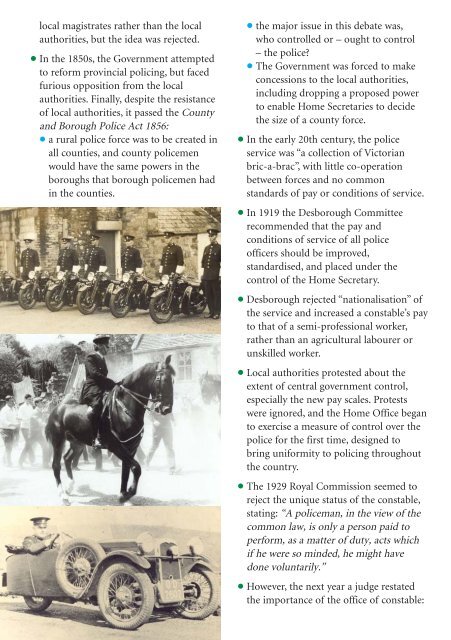Office of Constable pamphlet - Police Federation
Office of Constable pamphlet - Police Federation
Office of Constable pamphlet - Police Federation
You also want an ePaper? Increase the reach of your titles
YUMPU automatically turns print PDFs into web optimized ePapers that Google loves.
local magistrates rather than the local<br />
authorities, but the idea was rejected.<br />
• In the 1850s, the Government attempted<br />
to reform provincial policing, but faced<br />
furious opposition from the local<br />
authorities. Finally, despite the resistance<br />
<strong>of</strong> local authorities, it passed the County<br />
and Borough <strong>Police</strong> Act 1856:<br />
• a rural police force was to be created in<br />
all counties, and county policemen<br />
would have the same powers in the<br />
boroughs that borough policemen had<br />
in the counties.<br />
• the major issue in this debate was,<br />
who controlled or – ought to control<br />
– the police?<br />
• The Government was forced to make<br />
concessions to the local authorities,<br />
including dropping a proposed power<br />
to enable Home Secretaries to decide<br />
the size <strong>of</strong> a county force.<br />
• In the early 20th century, the police<br />
service was “a collection <strong>of</strong> Victorian<br />
bric-a-brac”, with little co-operation<br />
between forces and no common<br />
standards <strong>of</strong> pay or conditions <strong>of</strong> service.<br />
• In 1919 the Desborough Committee<br />
recommended that the pay and<br />
conditions <strong>of</strong> service <strong>of</strong> all police<br />
<strong>of</strong>ficers should be improved,<br />
standardised, and placed under the<br />
control <strong>of</strong> the Home Secretary.<br />
• Desborough rejected “nationalisation” <strong>of</strong><br />
the service and increased a constable’s pay<br />
to that <strong>of</strong> a semi-pr<strong>of</strong>essional worker,<br />
rather than an agricultural labourer or<br />
unskilled worker.<br />
• Local authorities protested about the<br />
extent <strong>of</strong> central government control,<br />
especially the new pay scales. Protests<br />
were ignored, and the Home <strong>Office</strong> began<br />
to exercise a measure <strong>of</strong> control over the<br />
police for the first time, designed to<br />
bring uniformity to policing throughout<br />
the country.<br />
• The 1929 Royal Commission seemed to<br />
reject the unique status <strong>of</strong> the constable,<br />
stating: “A policeman, in the view <strong>of</strong> the<br />
common law, is only a person paid to<br />
perform, as a matter <strong>of</strong> duty, acts which<br />
if he were so minded, he might have<br />
done voluntarily.”<br />
• However, the next year a judge restated<br />
the importance <strong>of</strong> the <strong>of</strong>fice <strong>of</strong> constable:
















